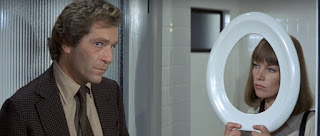Once again, we come to the point where we need to look back over the category and discuss the winner, whether they deserved it, and who did if they didn't.
Once again, the nominees for Best Story and Screenplay Based on Factual Material or Material Not Previously Produced or Published in 1973 were:
- American Graffiti, written by George Lucas, Gloria Katz and Willard Huyck
- Cries and Whispers, written by Ingmar Bergman
- Save the Tiger, written by Steve Shagan
- The Sting, written by David S. Ward
- A Touch of Class written by Melvin Frank and Jack Rose
The Winner: The Sting
Weighing the Nominees:
 |
| American Graffiti in a Nutshell |
It's difficult to describe what makes
American Graffiti on a screenplay level, but I'll try. It's a combination of a random events plot that's still compelling, as well as a nice snapshot of its time period that doesn't feel dishonest or pandering. While one could call it "60's cars and music: the motion picture", it's not like everything is just window dressing.
The movie has inspired a generation, and made stars out of nearly all its cast (oddly enough, its biggest future star had the smallest role of the main cast). The cars are neat to look at and the soundtrack is killer, but it's not all cars and songs, and it has some real heart. When school King suggests to his longtime girlfriend that while he's away at college they see other people, her reaction is entirely honest. She doesn't throw a scene, she doesn't dump him on the spot, but she's angry, and he's in trouble. The film is full of little honest moments like that.
And yes, the music, and interjections from DJ Wolfman Jack, do sort of underscore the action and provide a bit of hidden commentary, so much so that I wonder if the songs were part of the screenplay. If they were, this alone could put it near the winner's circle.
 |
| Cries and Whispers in Red and White |
Then there's the reddest of the red, Ingmar Bergman's classic drama,
Cries and Whispers, one of the final films not primarily in English to receive a Best Picture nomination for a couple of decades, before the love affair was renewed in the mid-90's. As I said in my initial review, I did appreciate the screenplay, and the performances, and the artistic way it handled topics like grief, love and hate, and made you question reality. While the color motif was probably self-indulgent, that's not a fault on the screenplay level. It's hard to qualify this film against the others, as this film is so different in tone, presentation and theme than any of its competitors. It would be like trying to decide if Shakespeare's
Coriolanus matches up with stories by Hemingway, Fitzgerald, Joyce Carol Oates and Flannery O'Connor. While I appreciated what it was doing, it was also kinda hard to watch, and the symbolism sometimes went over my head.
 |
| Henry and Hooker scheme together in The Sting |
On the other hand, I was gripped by
The Sting, a period dramedy that hit every note it was going for, and without any major flaws. In fact, the biggest issue I had with it was the idea that we were supposed to buy Robert Redford as an inexperienced kid, but that's not the screenplay's fault.
I said in my review that movies like this need a good build-up and a great pay-off. And it had both. I don't know what else to say because
The Sting is just a complete movie from start to finish. It just plain works. It's pretty rare for that to be the case, so it's very much under consideration for the win right now.
 |
| Two Jacks argue in Save the Tiger |
I did appreciate the nearly one-man show that is
Save the Tiger, and if I had a problem with it at all it was probably the fact that the one visible PTSD moment our character has comes very late in the film and isn't repeated, so it almost seems to come out of nowhere. That being said, the strength of this film was in Lemmon's performance, so I can't say this one is a winner. A deserved nominee, absolutely, but not a winner.
One thing I didn't talk about in my review was the reason for the title. Well, at one point Harry is asked to sign a petition to save the tigers in the rainforests of Africa because their numbers are dwindling. He does sign it, after taking a long look at the poster (which depicts a majestic tiger), possibly wondering if he and the tiger didn't have something in common; both had once been at the top of their game and now both needed someone else to save them.
 |
| Jackson and Segal reject the toilet seat in a Touch of Class |
Finally, I had a good time watching A Touch of Class, but can't say it was really an Oscar-worthy film. In a stronger year I don't think it would have gotten noticed. It was clever, charming and very funny, with some genuine sadness at the end, but it feels like a number of other romantic dramedies that have come both before and since. Maybe it was that aspect that the Academy latched onto; maybe it reminded them of some older classics like Lover Come Back, That Touch of Mink or The Apartment. I dunno, but it's pretty clearly not winning this.
Honestly, this time the Academy got it right. Some fierce competition from American Graffiti and Cries and Whispers, but they got it right.
My Choice: The Sting
Next up is Adapted Screenplay and then it's time to choose another category.




